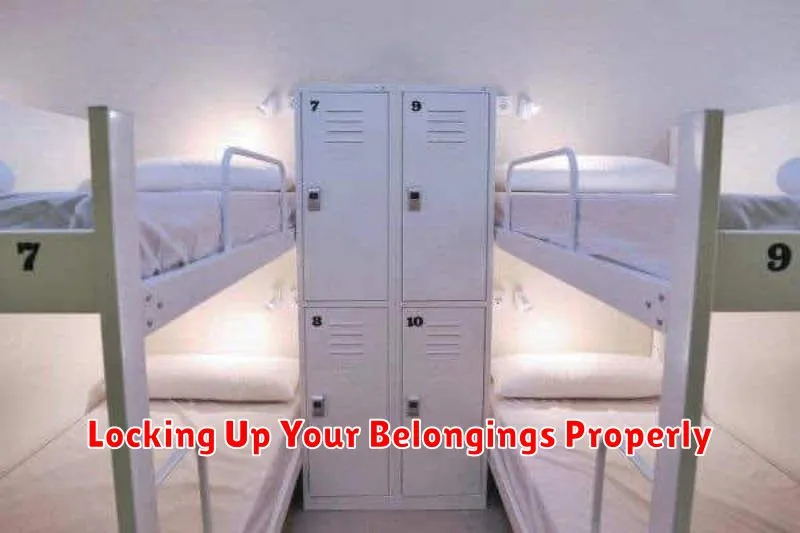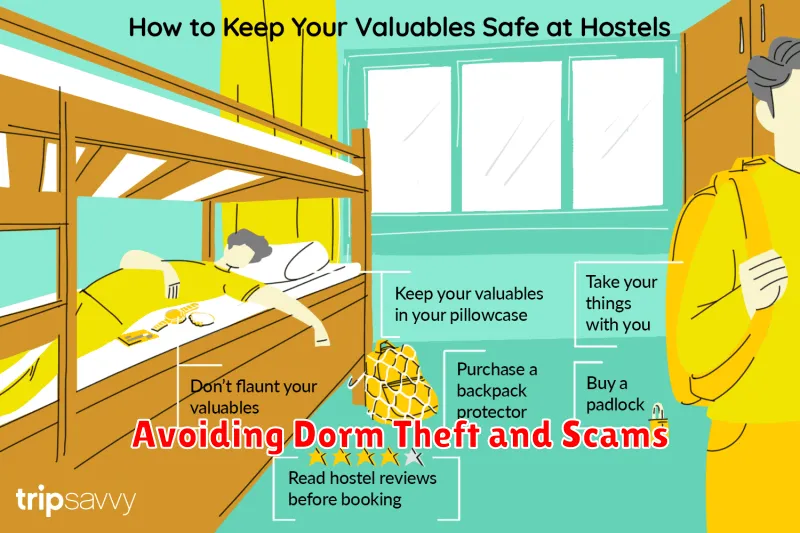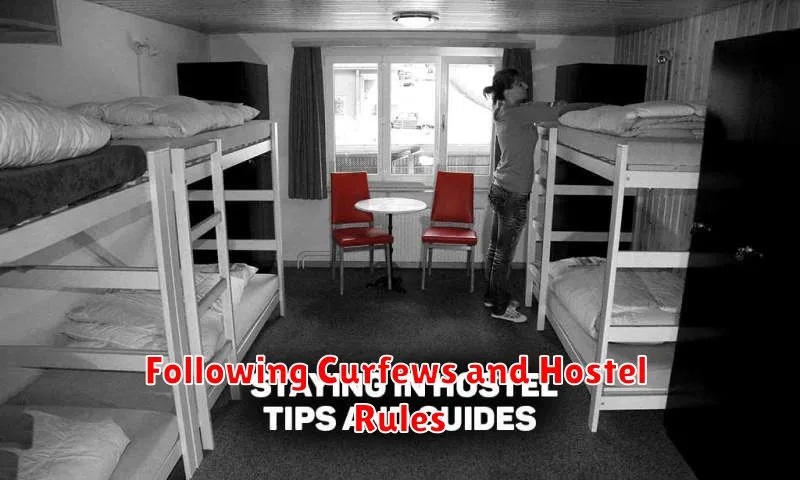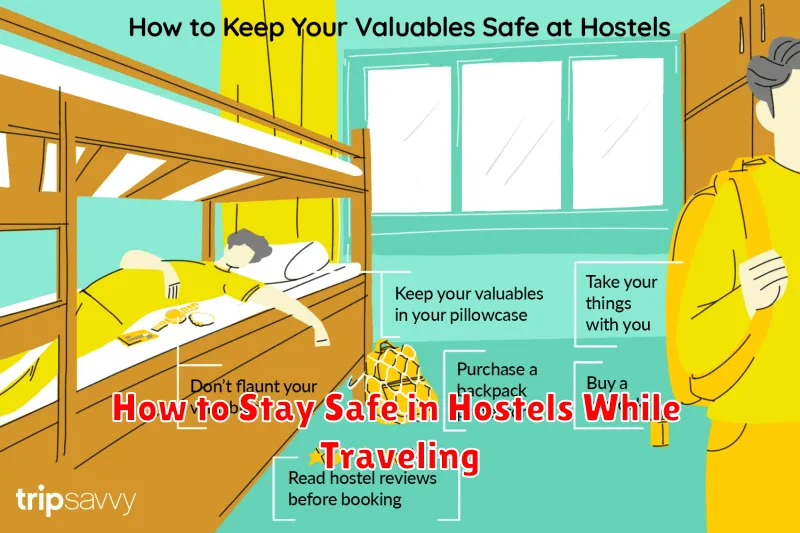Traveling on a budget? Hostels offer a safe, affordable, and social accommodation option for adventurers worldwide. However, like any shared space, staying safe in hostels requires a bit of vigilance. This article offers practical hostel safety tips for protecting yourself and your belongings while enjoying your travels. From securing your valuables to choosing the right hostel, we’ll cover essential safety advice for both new and experienced hostel travelers. Learn how to maximize your hostel experience while minimizing potential risks.
Whether you’re backpacking across Southeast Asia or exploring European cities, understanding potential hostel safety concerns is crucial for peace of mind. We’ll delve into key areas like personal safety, protecting your valuables with hostel lockers, and choosing a safe hostel in the first place. By implementing these hostel safety measures, you can focus on creating unforgettable memories and embracing the social atmosphere that hostels offer. Get ready to travel smart and stay safe in hostels around the globe.
Why Hostels Are Popular Among Travelers
Hostels offer a budget-friendly accommodation option, often significantly cheaper than hotels. This allows travelers, especially those on extended trips or with limited funds, to stretch their budgets further and experience more destinations.
The social atmosphere of hostels is a major draw. Shared rooms and common areas provide opportunities to connect with people from diverse backgrounds. This makes hostels an excellent choice for solo travelers looking to meet other adventurers.
Many hostels organize group activities and events, such as city tours, pub crawls, or movie nights. These offer a convenient and affordable way to explore a new place and socialize with fellow travelers.
Hostels often provide convenient amenities such as shared kitchens, laundry facilities, and common areas equipped with computers and Wi-Fi. These amenities offer practicality and cost savings for travelers.
Finally, hostels frequently boast central locations in cities, making it easy to access public transportation, attractions, and nightlife.
Choosing Reputable Hostels with Good Reviews
Selecting a safe and enjoyable hostel experience relies heavily on thorough research. Reviews are your greatest asset. Prioritize hostels with a substantial number of recent positive reviews on reputable platforms like Hostelworld and Booking.com. Pay close attention to comments about security measures, staff helpfulness, and overall cleanliness.
Look for specific mentions of security features such as lockers, keycard access, and 24-hour reception. A consistent theme of positive reviews regarding staff interaction indicates a well-managed and secure environment. Cleanliness is crucial for comfort and hygiene, so prioritize hostels with consistently high ratings in this area.
Don’t hesitate to cross-reference reviews across multiple platforms to get a well-rounded perspective. Be wary of hostels with overwhelmingly perfect reviews, as these can sometimes be fabricated. A mix of positive and constructive criticism often paints a more realistic picture.
Locking Up Your Belongings Properly

Hostel security largely depends on your own diligence. While most hostels strive to provide a safe environment, taking personal responsibility for your possessions is crucial. Always utilize provided lockers or safes for valuable items such as your passport, electronics, and extra cash.
If the hostel provides a padlock, use it. If not, bring your own high-quality lock. Avoid combination locks as they can be easily manipulated. Keyed padlocks are generally more secure. Ensure the locker is sturdy and properly secured to a fixed structure.
Don’t leave valuables lying around in plain sight, even in a seemingly empty dorm room. Be mindful of who is around you when accessing your locker. Discreetly secure your belongings and avoid displaying large amounts of cash.
Avoiding Dorm Theft and Scams

Dorm rooms, while offering budget-friendly accommodation, can sometimes pose risks of theft and scams. Be proactive in safeguarding your belongings and yourself. Always utilize provided lockers, especially for valuable items like passports, electronics, and cash. If lockers aren’t available, consider keeping valuables on your person, especially during sleep.
A high-quality padlock is essential. Avoid cheap locks that can be easily picked. Be wary of overly friendly individuals who might be attempting to gain your trust to steal from you. Don’t openly display large amounts of cash or expensive gadgets.
Be mindful of scams. Don’t fall for offers that seem too good to be true. Verify the identity of hostel staff if someone asks for your room key or personal information. If something feels amiss, report it to the hostel management immediately.
Following Curfews and Hostel Rules

One crucial aspect of hostel safety involves respecting curfews and adhering to established rules. Curfews, while sometimes perceived as restrictive, are often implemented to ensure the security and tranquility of all guests. Adhering to them demonstrates respect for fellow travelers and helps maintain a peaceful environment. Ignoring curfews can not only disrupt others but may also jeopardize your own safety, particularly in unfamiliar surroundings.
Beyond curfews, each hostel operates under a specific set of rules. These might pertain to quiet hours, kitchen usage, guest areas, or visitor policies. Familiarize yourself with these rules upon arrival. Often, they are posted in common areas or provided within welcome packets. Following these guidelines ensures a smooth and respectful coexistence with other guests and staff. It also contributes to a positive overall hostel experience.
Respecting these established parameters demonstrates consideration for others and contributes significantly to maintaining a safe and secure environment for everyone within the hostel.
Building Trust Without Being Too Trusting
Hostels foster a sense of community, encouraging interaction with fellow travelers. It’s natural to want to connect and build trust, but maintaining a healthy balance is crucial for your safety.
Be friendly but cautious. Engage in conversations and share travel stories, but avoid divulging overly personal information, especially regarding your itinerary or financial details. Don’t leave valuables unattended in common areas, even if others seem trustworthy.
Utilize lockers provided by the hostel. Secure your belongings, including your passport, electronics, and extra cash. A small padlock can offer significant peace of mind.
Observe your surroundings and the behavior of others. Trust your instincts. If a situation or individual feels uncomfortable, remove yourself. Report any suspicious activity to hostel staff.
Night Safety Tips in Shared Spaces
Staying safe at night in a hostel dorm requires a bit of extra vigilance. Always lock your valuables in your locker, even if you’re just stepping away for a moment. Consider bringing your own lock for added security.
Be mindful of your belongings and keep them close to you, especially electronics and documents. If you have a small bag or purse, you might consider taking it to bed with you.
If you feel uncomfortable or notice anything suspicious, alert hostel staff immediately. They are there to help ensure a safe environment for everyone.
Consider using earplugs to block out noise and an eye mask for a more restful sleep in shared spaces. This can help you stay alert during the day and contribute to your overall safety awareness.

